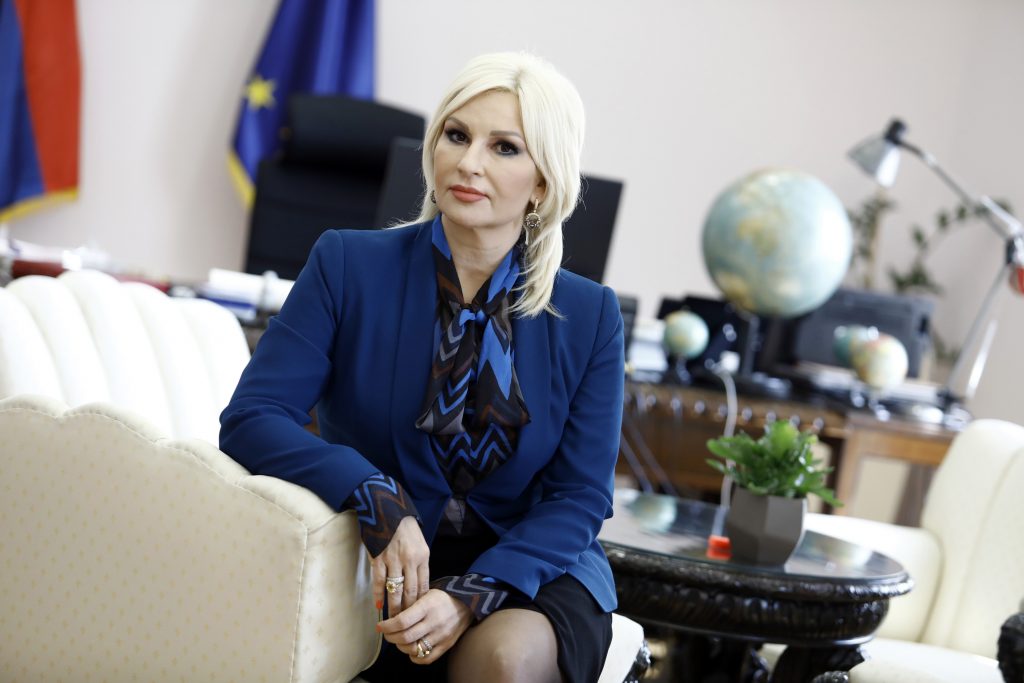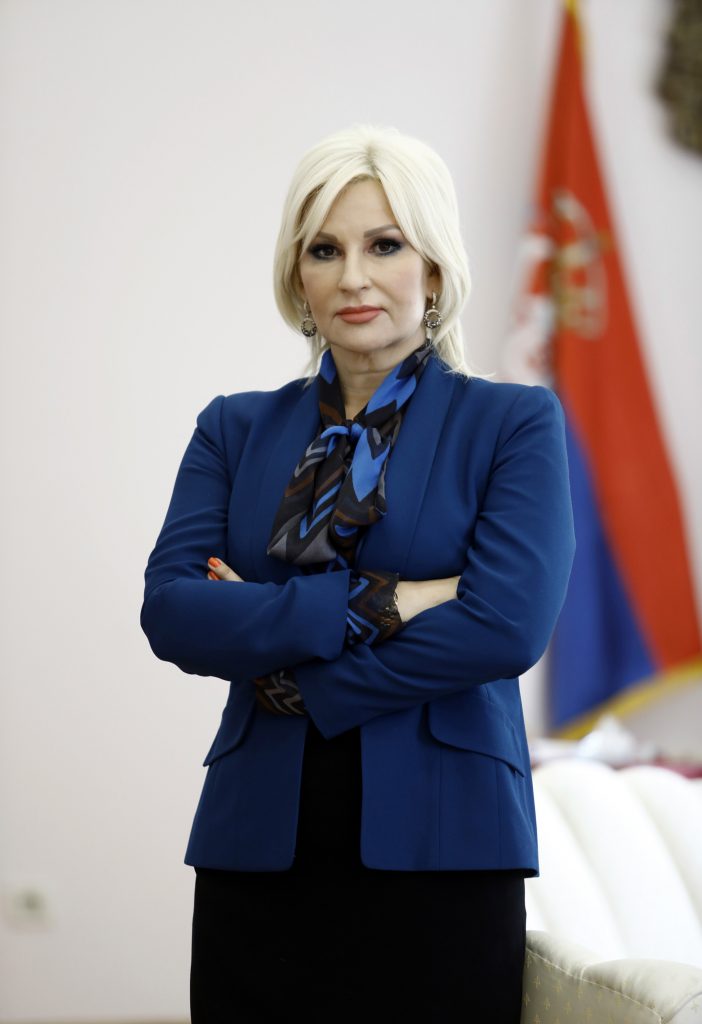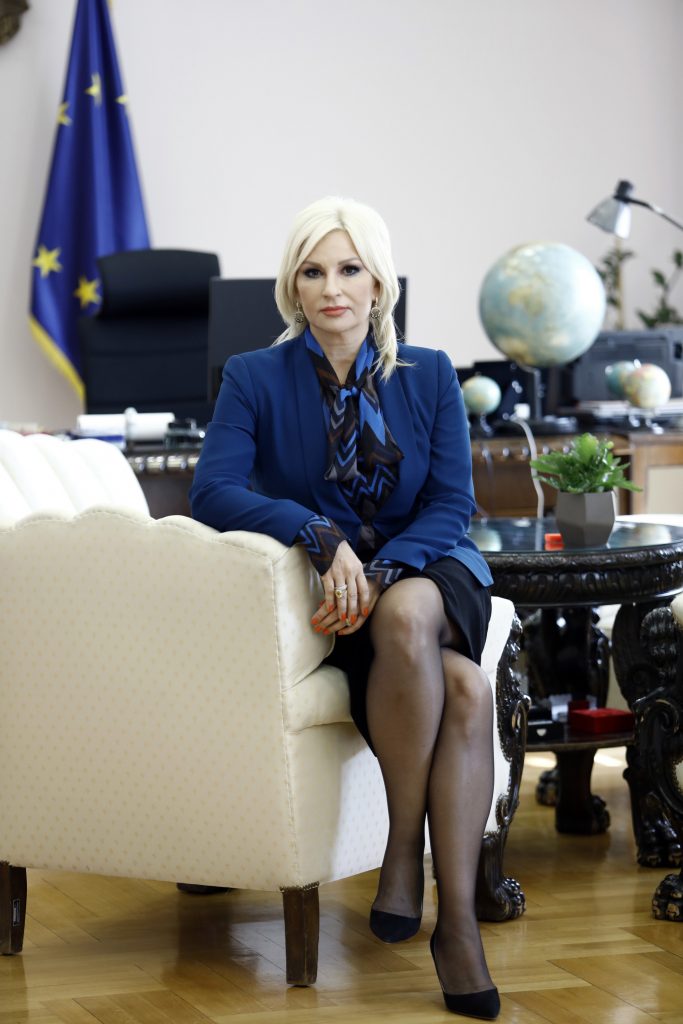During the pandemic, our main job was to keep Serbia moving and we have managed to achieve that objective. I believe that, in the coming days and months, we will be able to maintain the strong economic momentum that we have started.

„This is not the time to moan but to spring into action. The time has come for brave leaders. The only way to adapt to the new circumstances fast is to do everything in our power to keep our economy going. We will certainly not allow the pandemic to destroy everything that has been accomplished during the past years – from fiscal stabilization, regulation of public finances, the opening of new factories and the lowest unemployment ever to increase of civil servant salaries and pensions that was covered from real budget revenue”, Professor Zorana Mihajlović, PhD, Deputy Prime Minister and Minister of Construction, Transport and Infrastructure, says.
She does not negate the fact that numerous economic branches will feel the consequences of the COVID-19 pandemic. “Our estimation is that the damages the transport sector has suffered and will suffer due to the COVID-19 pandemic will amount to around half a billion euro by the end of the year. Air traffic was the most affected, where the direct damage due to the suspension of regular flights amounted to around 40 million euro in March alone. The situation is similar in the road and railway traffic, as well as river traffic,” says the Deputy Prime Minister and adds: “Tourism, hotels, catering and related economy sectors will certainly record losses. It is difficult to find an area that has not suffered losses. Just look at the problem that our citizens and travel agencies have found themselves in regard to holiday arrangements that had already been paid for.”
What selective measures does the Serbian government need to implement in response to the challenges in the aforementioned sectors?
One of the most important decisions that the ministry I helm has made at the very beginning of the pandemic was sustaining the largest construction sites. We knew that if the construction works stopped, we would need a lot of time and money to start them again. Organizing traffic at a time when borders were closed and when the curfew was in place was also a huge challenge because we could not allow any supply problems and shortages in stores. Of course, together with the Ministry of Foreign Affairs and the Cabinet of the President of Serbia, we helped Air Serbia to repatriate thousands of our citizens who were trapped at airports around the world and to deliver much-needed humanitarian and medical assistance. Now, you can see how visionary was the decision for Serbia to keep its national airline going.
Our main job was to keep Serbia moving and we have succeeded in that. I would like to thank all construction industry workers whom I consider to be real heroes, as well as to thank drivers, service technicians, sales staff, pilots and everyone else who worked every day to make it easier for the citizens to get through this very difficult time.
We also devised a set of economic measures to help the private sector, worth 5.1 billion euro. All workers will receive three minimum wages and we have also granted the deferred payment of taxes and of loans. Serbia is also going to be granted loans from international banks under favourable terms and conditions, so I believe that we will be able to maintain the very strong economic momentum that we have started.
In these elections, I expect that our electoral list, led by Aleksandar Vučić, will earn the new and deep trust of our citizens, because, we, at least the Ministry that I helm, have so many accomplishments to show to our citizens.

Given the strong budgetary financial assistance for businesses, how will this affect plans in your sector?
All ongoing infrastructure projects continue to be implemented and will not be jeopardized. We are currently working on the construction of more than 300 kilometres of new motorways. I believe that, in the end, we will have delays of only several months, which is not worrying. Companies from Serbia, China, Azerbaijan, the USA, Russia and Turkey have not stopped their activities on construction sites in our country. There had been problems with the delivery of equipment, but the works were not stopped at all.
On the other hand, our ministry, which is probably the biggest ministry in the Government of Serbia, set aside 100 million euro to help our health care, our doctors, nurses and other staff in the fight against the coronavirus, as well as to purchase the necessary medical equipment. That money was redirected from several projects that we planned for this year, including the launch of the construction of the Surčin-Novi Beograd motorway segment which was postponed. Roads are important, but the health of our citizens takes precedence.
What is happening with the key infrastructure projects in Serbia?
The construction of a high-speed railway from Belgrade to Budapest is the biggest construction project not only in Serbia but in the region too. The construction site in Čortanovci near Novi Sad, where the Russian Railways are digging another tunnel through Fruška Gora, and the construction the largest viaduct in the country, are the two largest construction sites in this part of Europe and there are no problems with them. By the year-end, we expect the Chinese company to will have completed the Belgrade-Stara Pazova road segment, and that, come autumn of 2021, we will have completed the section leading to Novi Sad. Once this is done, the commuting time between Novi Sad and Belgrade will last less than half an hour.
The construction of the Belgrade bypass and the Preljina-Požega motorway section, where the Chinese companies are contractors, are going according to plan. The Turkish company is building a new bridge over the Sava River near Sremska Rača, on the new motorway segment that will connect Belgrade and Sarajevo.
A commercial agreement on the construction of the Moravian Corridor was recently signed with the American-Turkish consortium Bechtel-Enka. How is the implementation of this agreement going?
Serbia, primarily its road companies, as well as the engineering profession, will benefit a lot from the contract we signed with the largest construction company in the world, Bechtel, stipulating the construction of the Moravian Corridor. We have already made an agreement for the future graduates of mechanical engineering, construction and other faculties to work on this project, in order to acquaint themselves with new motorway construction technologies on the spot.
Together with the investor, Koridori Srbije, we are here to help and expedite the solution of any problem. Just like the contract stipulates, we expect that Kruševac will have a motorway connection to Corridor by the year-end. After that, Kraljevo should be linked to the Miloš Veliki motorway, and then the main segment of the Moravian Corridor will have been completed by the end of 2023.
You have recently talked to the US Ambassador to Serbia, H.E. Anthony Godfrey about the aforementioned project and the resumption of the railway and air traffic between Belgrade and Priština. What are the expectations of the Serbian side regarding this?
We should not reduce transport and infrastructure to asphalt and stone. They are much more than that. They are also about implementing certain policies and managing political processes. Once it completes the new investment cycle, Serbia is going to have the highest number of motorways in the region. This is an investment in a safe future. There is no reason for Belgrade and Priština not to be better connected transport-wise as that is important both for the Serbs and Albanians living there. However, without Serbs and Albanians reaching an agreement, there will be no permanent and sustainable solution for Kosovo. And no solution for the Kosovo problem means that it would be impossible to reach our main foreign political objective which is a full-fledged EU membership.
A compromise solution, whereby the two sides both stand to lose and gain something and that will satisfy Serbian national interests and protect our citizens, their property and holy sites in Kosovo, is something that Serbia has been insisting on and regarding which we have both the EU’s and the US’ support.
The uncivilized episode with sanctions on goods originating from Serbia is behind us, and that was the biggest obstacle to the continuation of negotiations to find a permanent solution for Kosovo. I believe that, after the elections in Serbia and the formation of the new government in Priština, we will continue to work on finding a compromise in a much better and faster manner.
In regard to the relations between the United States and Serbia, I want to express my great satisfaction with the stronger and better political, economic and cultural relations that our two countries have today, and I believe that these relations will be even better in the future. It is extremely important that the United States and Ambassador Anthony Godfrey continue to perpetuate the good tradition of American diplomacy, which sees Serbia as the leading partner in the region. I am also glad that the traditional Serbian cuisine, which Ambassador Godfrey likes very much, made its modest contribution to that.
I believe that, after the elections in Serbia and the formation of the new government in Priština, we will continue to work on finding a compromise in a much better and faster manner.

What are your expectations for this and next year?
Ahead of us are the parliamentary and local elections that will be held at the end of June. In these elections, I expect that our electoral list, led by Aleksandar Vučić, will earn the new and deep trust of our citizens, because, we, at least the Ministry that I helm, have so many accomplishments to show to our citizens that we have achieved during the last term in the office. Once the votes are counted, the formation of a new parliament and a new government awaits us.
In terms of the new Government of Serbia, but also the new convocation of the Parliament, I expect changes at all levels. New people get their chance because only fresh blood can bring the necessary new energy and new ideas for the times ahead. But, I also expect that success and achieved results will be one of the most important criteria that Serbian voters will use when electing a new government and parliament members. In the end, the state of emergency and pandemic showed that expertise and experience are key in situations when difficult and important decisions need to be made for citizens and the state.
On the other hand, I believe that the vast majority of citizens, including me, will also use this year to get used to a new way of life, to living with the virus. Many things will be different, travel will not be the same, our societies will change. It seems that the whole world will transition from globalization to the time of disintegration, in which everyone will take much more care of themselves than before. It will certainly be very challenging to lead the country in these new circumstances in which we need to find the right place for Serbia in such a changing world.